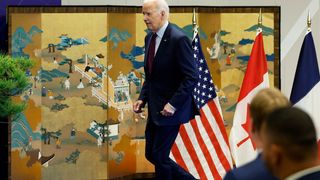It was Michigan Republican senator Arthur Vandenberg who, in 1948, signalled his party’s shift from its pre-war isolationism to its post-war internationalism. Vandenberg put it succinctly and timelessly: “We must stop partisan politics at the water’s edge.”
This was embraced by president Harry S. Truman, a Democrat from Massouri, and much of the congress, having learned from the debacle of America’s failure to endorse and embrace the League of Nations in March 1920. Truman understood president Woodrow Wilson’s idealism had been fatally wounded by his own partisanship. America never joined the League, and Wilson suffered a crippling stroke during his campaign for American membership.
Winston Churchill always held the private view that America’s absence from the League of Nations in Geneva made the arrival of the Second World War far more likely. A continuing American presence in international affairs, clustered with the other democracies, particularly Britain and France, could well have served to deter the dictators during the years 1931 to 1939.
This has happened on previous occasions when presidents Bill Clinton and Barack Obama were compelled to cancel regional visits because of Republican Party pressure in congress on matters of budget. This is more than crude partisanship, it is destructive of Western interests. Richard Nixon was astute in understanding America did not need a president for domestic affairs. The president must focus on foreign affairs, military and national security policy.
The diplomatic clawhammer inherent in the first Cold War meant that after 1945 American foreign policy debates largely stopped well short of the water’s edge. Unfortunately, this is no longer the case within elements of the US congress, and the water’s edge now seems to be the Tidal Basin in Washington DC rather than the Atlantic or Pacific oceans. This has not gone unremarked in the capital itself.
In an insightful recent New Yorker essay, entitled appropriately “ ‘Debt-limit terror’ is no way to run a superpower”, Susan B Glasser argues scathingly that big news on Capitol Hill meant something beyond the water’s edge: “For the rest of the world, it was merely a sign of the capital’s extreme dysfunction, and a reminder that America’s messed-up politics constitutes a geopolitical crisis as well as a domestic one.”
This reality is amply reinforced by President Joe Biden being obliged to cancel part of his Asia-Pacific visit to Papua New Guinea and Australia.
Both legs of this journey involved critical considerations of US and regional security. While a brief but productive Quad leaders meeting was stitched together in Hiroshima, the absence of the US President in Port Moresby, signing an agreement and engaging with the leaders of the Pacific Islands Forum, is far more than a missed opportunity. It reinforces a campaign run by regional adversaries who ask the locals continuously: “Where are your American friends?”
This has happened on previous occasions when presidents Bill Clinton and Barack Obama were compelled to cancel regional visits because of Republican Party pressure in congress on matters of budget. This is more than crude partisanship, it is destructive of Western interests.
Richard Nixon was astute in understanding America did not need a president for domestic affairs. The president must focus on foreign affairs, military and national security policy.
The current disappointing state of play in the cancellation of the presidential visit is simply emblematic of an extraordinary degree of petty politicking in Washington. The House Republican Conference apparently insisted on narrowing negotiations and on talking directly with the White House. This has earned Speaker Kevin McCarthy, to date, one photo opportunity.
What is at stake of course is the full faith and credit of the US if the American debt ceiling is not raised. The debt ceiling currently stands at $US31.4 trillion, a staggering fact in itself.
But even worse, Treasury Secretary Janet Yellen has concluded that if the debt ceiling is not raised by June 1, the US may be in danger of defaulting on its loans. The partisan nature of the Republican confrontation with the Biden administration is reflected in demands that bear down heavily on America’s working poor, particularly on Medicaid.
The polarisation in Washington DC brought this embarrassment on the US, to the discomfort of Biden and the dismay of America’s friends. Harry Truman understood the truth of Arthur Vandenberg’s words.
All of this, of course, is directly related to the 2024 presidential election. But the impact of such squabbling means, effectively, the full faith and credit of the US for its allies and partners is thrown into question.
Joe Biden did not bring this argument on. All the evidence suggests the Biden administration understood both the significance and signalling of the Quad meeting in Sydney and the signing of the agreement in Port Moresby. Congressional Republicans ought to approve.
US Secretary of State Antony Blinken has a key phrase to describe American foreign policy while rejecting economic coercion and debt diplomacy: “We’re not asking people to choose; we want to give you a choice.” This is an admirable sentiment, but to offer a choice America must be present where it is required for progress to be made, whether in Port Moresby or Port Vila.
The polarisation in Washington DC brought this embarrassment on the US, to the discomfort of Biden and the dismay of America’s friends. Harry Truman understood the truth of Arthur Vandenberg’s words.
To illustrate, Truman rejected sending to congress the draft “European Recovery Program” named after him. Instead, this emerged as “The Marshall Plan”, named after respected secretary of state General George C. Marshall, and post-war transformation in Europe followed.
Congressional behaviour needs to lift. Relations with the South Pacific matter and, more meaningfully, so does the Quad. The full faith and credit of the US has consequences far broader than just the debt ceiling.






